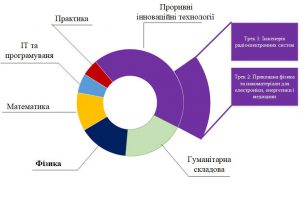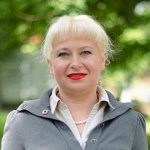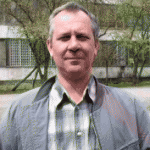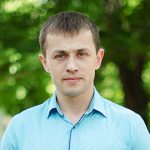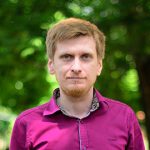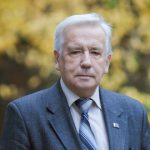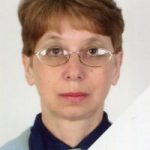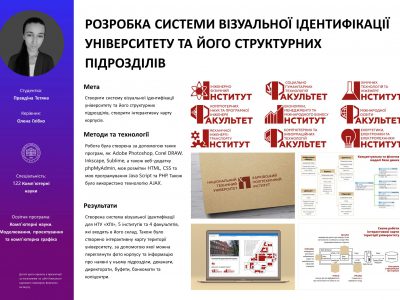105
Applied physics
and nanomaterials
Applied physics and nanomaterials for energy, medicine, radio electronics and telecommunications
«Прикладна фізика – це застосування фізики до вирішення дослідницьких, інженерних чи технологічних проблем. Зазвичай, це спеціальність яку можно вважати містком, що зв’язує фізику як науку про явища та процеси з прикладаними задачами створення інноваційної техніки або проривних технологій.» (wikipedia.org)
“Applied physics is the application of physics to solve scientific or engineering problems. Usually, this is a specialty that can be considered a bridge that connects physics as a science of phenomena and processes with applied tasks of creating innovative equipment or breakthrough technologies.“
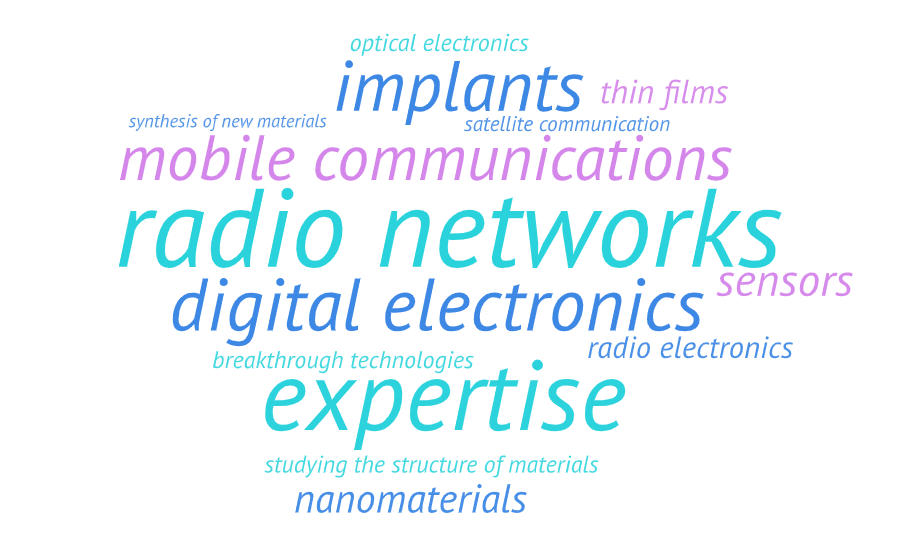
Bachelor
of Applied Physics and Nanomaterials

Training period
4 years / 240 ECTS credits

The form of study
full-time

Навчальний план.
characteristics of the educational program
The main focus of the educational program: special education in the field of solid-state physics and the physical foundations of electronic devices and radioelectronics technologies in the subject area of the analysis of physical properties and effects, which are aimed at creating new innovative technologies. This educational program is structured in such a way that in the first and second years, students receive basic training in the specialty, which is provided by the standard of Ukraine in the field of higher education for this specialty.
This is fundamental in-depth training in the field of physics, mathematics, the basics of information technologies, special sections of material physics, special sections of physical electronics, computer modeling technologies of physical phenomena. Starting from the second year, education is formed into two streams:
- general mandatory training in the specialty;
- one from two breaths of selective educational tracks.
General mandatory training provides knowledge in the field of physics, which is aimed at the applied aspects of the study of physical phenomena and processes that underlie advanced engineering technologies. Mandatory professional training is presented in the figure as a structural and logical scheme and provides a basis for mastering applied directions, which are formed in educational elective tracks.
Features of the program
Access to unique radio telecommunication equipment (access to the largest space sensing station in Europe)
The use of our own unique equipment for the creation of nanoscale structures, which allows studying the technologies of obtaining new materials, sensors, implants
Strong scientific ties with institutes of Ukraine, Europe and China
Individualization of education with a focus on the student: selective special courses, original practical and scientific projects
After studying in the 1st year, there is a choice of the following educational trajectories:
Docent LEVON OLENA (guarantor of the bachelor’s educational program) Candidate of technical sciences | KUZMENKO NATALIIA Candidate of historical sciences | |
Professor ZUBARIEV YEVHENII (guarantor of the master’s educational program 1.9 years) Doctor of physical and mathematical sciences | Docent KOZLOV SERHII Candidate of technical sciences | |
Professor MALYKHIN SERHII (guarantor of the master’s educational program 1.4 years) Doctor of physical and mathematical sciences | Senior Lecturer RYMAR SERHII
| |
Professor PODIACHYI YURII Candidate of Physical and Mathematical Sciences | Professor MOSKALETS MYKHAILO Doctor of physical and mathematical sciences | |
Senior Lecturer RUDCHENKO SVITLANA Candidate of Physical and Mathematical Sciences | Senior Research Fellow SHYPKOVA IRYNA Candidate of Physical and Mathematical Sciences | |
KONOTOPSKYI LEONID Candidate of Physical and Mathematical Sciences | Professor SIPATOV OLEKSANDR Doctor of physical and mathematical sciences |
.
Educational trajectory – Engineering of radioelectronic systems
Graduates are specialists of a broad profile, able to develop various radioelectronic and telecommunication equipment (from receivers to large radiotechnical research systems and mobile and satellite communication systems), deal with complex signal processing, radiophysical monitoring of the environment, development and debugging of radiotechnical and radiophysical equipment ; maintenance of complex radio technical systems; development and maintenance of computer and computerized automatic control systems; electronic energy supply systems, mobile and satellite communication systems; research of the space environment. The training of specialists is carried out jointly with the Institute of the Ionosphere of the National Academy of Sciences and the Ministry of Education and Science of Ukraine.
Main academic disciplines
Microprocessor systems
GRID technologies in radio physics
Signal generation and shaping devices
Devices for receiving signals
Databases
Semiconductor and optical electronics
Analog and digital electronics
Microwave antennas and devices
Computer design of radio electronic systems
Signal processing methods and systems
Graduates' suitability for employment and further education
A graduate can work as a specialist in the field of communication lines and networks, as a computer software engineer, as well as engineering and technical personnel in research institutions, in information and analytical departments of enterprises in the manufacturing sector, in systems development organizations and data transmission and processing networks, a specialist in telecommunications technologies, a system administrator, etc.
Learn more about the companies and enterprises that offer employment for students and graduates of our institute, as well as familiarize yourself with the requirements, duties and skills of candidates for current vacancies, possibly by following this link.
A student who has completed training under this educational program and received a bachelor’s degree can continue his studies in universities of Ukraine and abroad to obtain the next (master’s) level of higher education in the relevant educational-professional or educational-scientific programs.
Educational trajectory - Applied physics and nanomaterials for electronics, energy and medicine
The main direction of the training of specialists is the study of physical processes and phenomena, technological processes and the development of the physical foundations of the creation of new devices, apparatus, equipment, materials, and substances. As well as in-depth computer training for managing technological processes and synthesis. Students acquire knowledge in the field of solid state physics, study modern methods of synthesis of the latest materials, learn the basics of high-tech nanomaterials, receive in-depth computer training for synthesis control, master methods of researching the properties, composition, structure of materials and modern equipment for their quality control.
Main academic disciplines
Physical foundations of nanotechnology
Non-destructive control methods
Materials for biology and medicine
Crystal structure defects and strength theory
Methods of structural analysis
Technologies of thin films
Radiation resistance of metals
Комп'ютерне проектування радіоелектроних систем
Graduates' suitability for employment and further education
After completing the bachelor’s degree, graduates can work as specialists in the field of solid state physics, physical materials science, nanotechnology and materials, an expert in the field of material quality control and assessment, a technologist of nano- and micromaterials, a scientist in the field of applied physics, etc.
Дізнайся більше про компанії Learn more about the companies and enterprises that offer employment for students and graduates of our institute, as well as familiarize yourself with the requirements, duties and skills of candidates for current vacancies, possibly by following this link.
A student who has completed training under this educational program and received a bachelor’s degree can continue his studies in universities of Ukraine and abroad to obtain the next (master’s) level of higher education in the relevant educational-professional or educational-scientific programs.
Приклади студентський дипломних робіт
If you are our graduate, leave your feedback, it is important for us to hear your opinion. Please fill out this survey form.
We are on social networks:
Спеціальності 105 Прикладна фізика та наноматеріали надається особлива підтримка. Подаючи заяву з 1-м пріоритетом на цю спеціальність, Ви значно збільшуєте свої шанси на вступ на бюджет!
РОЗРАХУНОК КОНКУРСНОГО БАЛУ для вступу на спеціальність 105 Прикладна фізика та наноматеріали
КБ = 0,5×П1 + 0,2×П2 + 0,2×П3 + 0,1×А
П1 – оцінка з української мови
П2 – оцінка з математики
П3 – оцінка з фізики або іноземної мови
А – середній бал атестата
Остаточно конкурсний бал (КБ) множиться на додаткові коефіцієнти. Регіональний 1,02 – для міста Харкова. Галузевий 1,02 – для поданих заяв з пріоритетністю 1 та 2 на спеціальності, яким надається особлива підтримка. Сільський 1,05 – для осіб, зареєстрованих у селах та які здобули повну загальну середню освіту у закладах освіти у рік вступу, що знаходяться на території сіл, для спеціальностей, що користуються особливою підтримкою.
